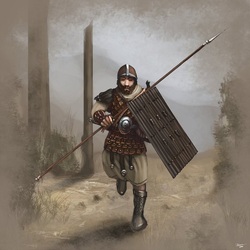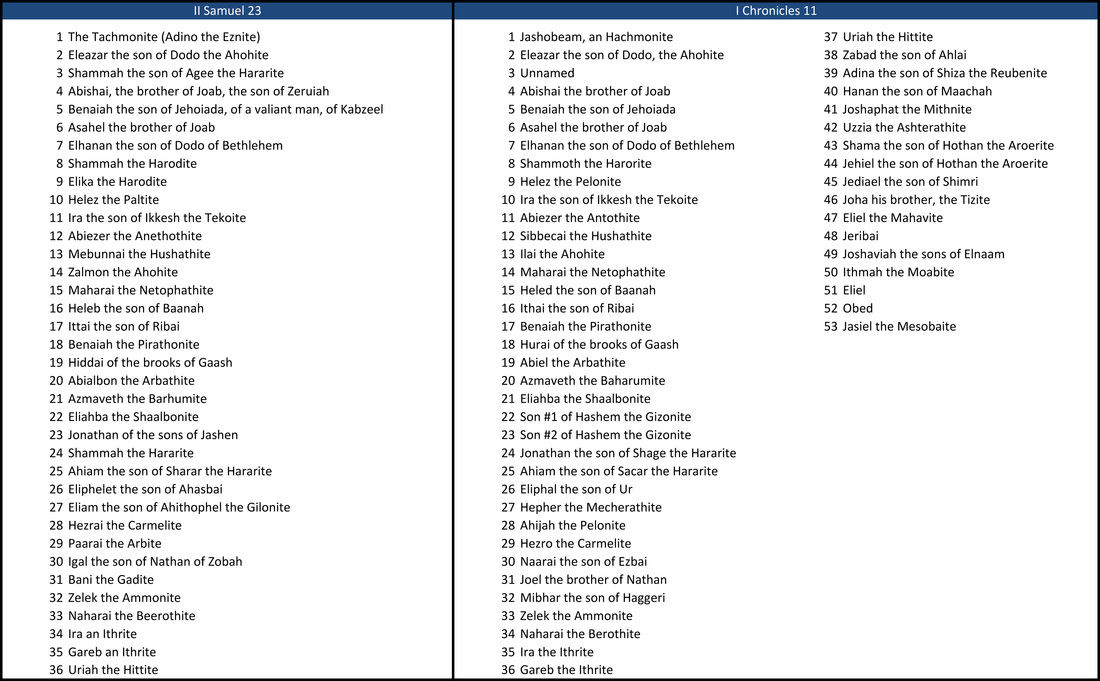 I love studying the supposed contradictions of Scripture. They're like little puzzles that God placed throughout His Word just to make it more interesting. When I was in college, I downloaded a list of over 300 contradictions, and working my way through that list was one of the most reassuring things that I've ever done. I was able to prove to myself time and time again that God's Word really is perfect in every way. Yesterday, I was confronted with another supposed contradiction, and once again, I found that God's Word is without flaw. This particular contradiction comes from II Samuel 23:8 and I Chronicles 11:11. Here is what we find in those two passages of Scripture: These be the names of the mighty men whom David had: The Tachmonite that sat in the seat, chief among the captains; the same was Adino the Eznite: he lift up his spear against eight hundred, whom he slew at one time. (II Samuel 23:8) And this is the number of the mighty men whom David had; Jashobeam, an Hachmonite, the chief of the captains: he lifted up his spear against three hundred slain by him at one time. (I Chronicles 11:11) As you can see, the first passage says that the chief of David's might men slew 800 men at one time, but the second verse says that he only slew 300 men at once. Which one is correct? The answer that is most commonly given in commentaries is that the I Chronicles passage is correct and the II Samuel passage is a scribal error. This explanation satisfies most Christians, but I think that attributing this difference to a scribal error is way too premature. There is a better answer available, but to see it we have to do something that modern Christians hate to do. We have to actually read and think about the entire list of names given in each chapter. Yes, I realize that this suggestion is almost heretical, but I'll make it easier on you. I've placed the entire list of names from each chapter in a table that should make the solution to this contradiction easily apparent. That wasn't too difficult at all; was it? Now that we've glanced at the big picture of the two lists, it is immediately apparent that there is something more going on here than just a simple scribal error. Sure, its possible that a scribe at some point in time might have written 800 where he should have written 300, but can we honestly blame a difference of 17 names on a simple scribal error? I don't think so. There must be another solution which accounts for the differences in both the number of men killed by David's chief captain as well as the number of mighty men that followed David.
This solution is found in verse 1 of II Samuel 23. That verse begins with the phrase: "Now these be the last words of David." This tells us that the list in II Samuel 23 was compiled at the end of David's life. But when we read I Chronicles 11, we discover that this list encompasses the time period when "David waxed greater and greater" (vs. 9). Thus the list in I Chronicles 11 was compiled early in David's reign, and the list in II Samuel 23 was compiled at the end of his reign. Once we recognize this distinction between the two lists, the differences between them start to make more sense. First, the men in these lists were all soldiers, so we would expect the list to grow shorter as various men lost their lives in battle. And second, if we had a complete catalog of all the accomplishments of each man on these lists, we would expect the later list to contain at least a few accomplishments which surpassed the greatest accomplishment on the earlier list. (We would expect the same thing in two lists of Olympic records.) This is exactly what we see in these passages. The later list given in I Samuel 23 has fewer names than the one in I Chronicles 11, and it also names one individual who beat his own record. Instead of being a contradiction, the relationship between these two passages actually solidifies our confidence that they are recording real, historical events.
10 Comments
7/17/2014 04:21:59 pm
Interesting, great points about the timeline involved! I actually see another possibility personally, that there were two separate people renowned for spectacular feats, Jashobeam who killed 300, and Adino, who killed 800. Adino is actually mentioned in both chapters, but way down at verse 42 in 1 Chronicles 11 as "the son of Shiza the Reubenite, a captain of the Reubenites".
Reply
Kevin Hines
8/20/2015 07:00:40 am
I saw that as well!
Reply
Terry Frala
12/9/2014 03:53:34 am
Understand that I do not believe the Bible contradicts itself, but I did want to point out something in your explanation that may need further clarifying. As I understand, you are saying that the list in II Samuel comes from the end of David's reign. But the last entry is Uriah the Hittite, who would not have been there at the end of David's reign due to David's sending him into battle to be killed in chapter 11.
Reply
Sean
2/5/2015 02:25:32 pm
Perhaps it was complied toward the middle which would fit better with Uriah (who was killed like 20ish years before David died)
Reply
Neil Roy
9/29/2015 08:10:16 am
I thought the answer was simple and required no study at all. Both entries state "whom he slew at one time". The two entries could simple be talking about different battles. They never state they are talking about the total numbers that they slew in their lifetime. The fact that there are many ways to explain this proves it is not a contradiction.
Reply
Ryan Flanagan
2/4/2021 07:52:18 pm
God bless you! keep sharing God's Word Jesus loves you may The Holy Spirit guide you now and forevermore in Jesus Name we pray amen!
Reply
Juda
8/23/2021 10:50:14 am
Wow, I can't thank you enough for this, mr. Fortenberry!
Reply
BRIAN PLUMMER
3/24/2022 11:29:03 pm
(2 Samuel - Chapter 23) and (1 Chronicles - Chapter 11) are detailing the same stuff. One or the other has more or less info. So one has to transfer the missing info in Chronicles to the respective verse(s) in Samuel to get the full story. It should be noted that Biblical characters often have more than one name or variation of their name or tribe. So if I was combining (2 Sam. 23:29) and (1 Chron. 11:30), I would just put the variant name or tribe in parenthesis versus having it as an additional word in the message. That full message would be: "Heleḅ (Ḥeled), the son of Baanah the Netophathite, Ittai (Ithai), the son of Riḅai from Giḅah of the sons of Binyamin."
Reply
Maqsood Bhatti
1/6/2024 02:06:28 am
thanks for sharing. Great efforts. really blessed.
Reply
Maqsood Bhatti
1/6/2024 02:05:11 am
I really blessed to read, thanks for sharing
Reply
Your comment will be posted after it is approved.
Leave a Reply. |
Bill Fortenberry is a Christian philosopher and historian in Birmingham, AL. Bill's work has been cited in several legal journals, and he has appeared as a guest on shows including The Dr. Gina Show, The Michael Hart Show, and Real Science Radio.
Contact Us if you would like to schedule Bill to speak to your church, group, or club. "Give instruction to a wise man, and he will be yet wiser: teach a just man, and he will increase in learning." (Proverbs 9:9)
Search
Topics
All
Archives
June 2024
|



 RSS Feed
RSS Feed